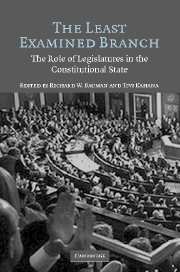Book contents
- Frontmatter
- Contents
- Foreword: Legislatures in the Constitutional State by Amy Gutmann
- Contributors
- New Ways of Looking at Old Institutions
- PART ONE LEGISLATURES AND DEMOCRATIC THEORY
- PART TWO LEGISLATING AND DELIBERATING IN THE DEMOCRATIC LEGISLATURE
- PART THREE CONSTITUTION MAKING BY LEGISLATURES: THE EXPLICIT VERSION
- PART FOUR CONSTITUTION MAKING BY LEGISLATURES: THE IMPLICIT VERSION
- PART FIVE CONSTITUTIONAL INTERPRETATION AND APPLICATION BY THE LEGISLATURE
- PART SIX IS LEGISLATIVE CONSTITUTIONALISM POSSIBLE?
- PART SEVEN THE LEGISLATURE IN DIALOGUE: DOMESTIC AND INTERNATIONAL CONTEXTS
- Index
Foreword: Legislatures in the Constitutional State by Amy Gutmann
Published online by Cambridge University Press: 06 August 2009
- Frontmatter
- Contents
- Foreword: Legislatures in the Constitutional State by Amy Gutmann
- Contributors
- New Ways of Looking at Old Institutions
- PART ONE LEGISLATURES AND DEMOCRATIC THEORY
- PART TWO LEGISLATING AND DELIBERATING IN THE DEMOCRATIC LEGISLATURE
- PART THREE CONSTITUTION MAKING BY LEGISLATURES: THE EXPLICIT VERSION
- PART FOUR CONSTITUTION MAKING BY LEGISLATURES: THE IMPLICIT VERSION
- PART FIVE CONSTITUTIONAL INTERPRETATION AND APPLICATION BY THE LEGISLATURE
- PART SIX IS LEGISLATIVE CONSTITUTIONALISM POSSIBLE?
- PART SEVEN THE LEGISLATURE IN DIALOGUE: DOMESTIC AND INTERNATIONAL CONTEXTS
- Index
Summary
The distinctive role of legislatures in expressing and pursuing the goals of constitutional democracies is the subject of this volume, and it could not be more important, timely, or wide-ranging. The contributors are prominent scholars who have helped to frame some of the most original perspectives on this subject.
Constitutional democracies form and express their ideals through two mechanisms. First, they contain broadly representative political bodies, which we call legislatures. Second, they are constituted by a constitution (written or unwritten) whose laws support a set of democratic procedures and substantive rights that are more basic than the ordinary statutes routinely passed by legislatures.
This volume considers how legislatures can support both the procedural and substantive goals of a constitutional democracy. Contributors consider the principles that should govern legislation; the ways in which legislatures can serve as lawmakers, law followers, and codeterminers with courts of constitutional law; and how legislatures can engage in productive dialogue with citizens and courts at home and peer institutions in other countries.
The primary reason why this subject is so timely and important is that constitutional democracies have been multiplying throughout the world; yet, theorists and practitioners of constitutional democracy alike have yet to fully grasp just how legislatures and courts should divide up the labor of furthering democratic and constitutional values. The virtue of this volume is that it does not pretend to settle this extremely complex issue, but rather it intelligently explores almost every plausible permutation of an answer.
- Type
- Chapter
- Information
- The Least Examined BranchThe Role of Legislatures in the Constitutional State, pp. ix - xivPublisher: Cambridge University PressPrint publication year: 2006

